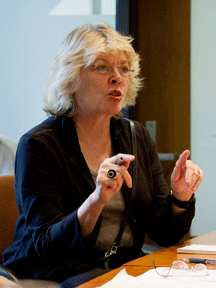By Scott Bartley
Professor of English at the University of Washington and Director of the Simpson Center for the Humanities, Kathleen Woodward is one of eleven Phi Beta Kappa senators recently elected at the 43rd Triennial Council. And she comes to Phi Beta Kappa prepared to answer some of the most critical questions currently facing higher education.
Such questions have been electrifying the air recently, motivating a blog post by Phi Beta Kappa Secretary John Churchill titled “An Ocean of Presumption,” which itself was written in response to Peter Cohan’s piece on Forbes “To Boost Post-College Prospects, Cut Humanities Departments.” Churchill identifies Cohan’s stance as a “conception of higher education that regards it as nothing more than a pipeline of supplies.” But Churchill protests, “is it only that?” He leaves the reader contemplating serious questions: “Just how snug is the joinery supposed to be between what higher education produces and what employers want in a given hiring season?” And “what is the role of the study of the humanities?” While the post is exploratory rather than sermonic, Churchill does offer that “America’s founders thought that a big role—maybe the biggest role—of higher education was to equip citizens for democracy and to raise the cultural level of the country.”
Such a conception of the humanities complements a similar one Woodward voiced and contemplated only a couple of years ago, in the article “The future of the humanities—in the present & in public,” published in the Winter 2009 issue of Daedalus. She writes “there is a long historical tradition of the democratic impulse in higher education in the United States, and we need to reinvigorate that founding vision.” For her, and other scholars, such a reinvigoration is taking shape as what has come to be called the public humanities, or public scholarship. Essential is the effort both to shape and confirm higher education as a “public good,” explained Woodward in an interview. That ideal champions scholarship that addresses multiple communities—not just the community of professional academics—and not in a pedantic, condescending way, but in a way that’s mutually invigorating.
It’s lofty language, for sure. But Woodward is also making very tangible progress. The graduate Certificate in Public Scholarship was launched at the University of Washington in 2010. An upcoming newsletter from the Simpson Center explains that “central to the fifteen-credit Certificate is a portfolio that offers students a space in which to both document and reflect upon their scholarship—in, with, and for publics.” In the process, students articulate the significance of their work to “different kinds of audiences—lay audiences, professional audiences, students.” The Certificate already enrolls twenty-seven students across humanities departments. According to the newsletter, the Certificate joins a number of new and emerging likeminded programs at The University of Wisconsin, Madison, The University of Southern California, and Harvard University, among other networks and movements.
In his response to Churchill, “Phi Beta Kappa’s Hollow Defense of Humanities,” Peter Cohan quips that perhaps academics are merely afraid of “a descent from the ivory tower.” Phi Beta Kappa does not fear such a descent; the effort to reach out to publics is a duty elevated by its own integrity. New senator Kathleen Woodward is indeed representative of the large and growing number of academics already eschewing cloistered study in favor of embracing the world we all live in.
Woodward acknowledges the essentiality of infrastructure, investment, and job training, but she also testifies “we need intellectual diversity in the way that we need biodiversity.” It is that indispensable to the full and fruitful life. And so Woodward is “not only honored but also excited” to be one of the new senators, because she harmonizes with “new initiative that Phi Beta Kappa is undertaking to really insist on the importance of the liberal arts in higher education for the—and I break this word into two—common wealth of the country, and the world.”
Scott Bartley is a new member of Phi Beta Kappa from Amherst College where he earned a bachelor’s degree in English. Amherst is home to the Beta of Massachusetts chapter of Phi Beta Kappa.




